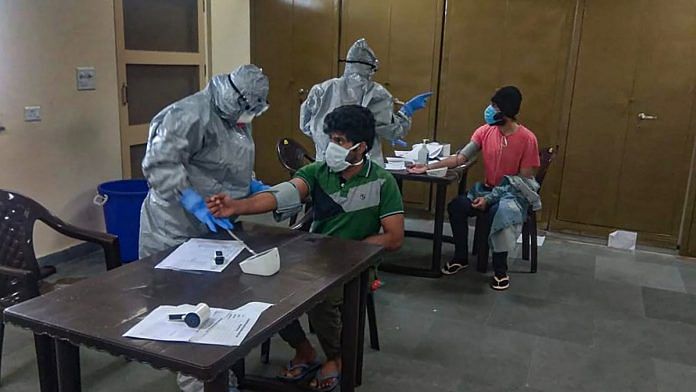New Delhi: A five-member committee constituted by the Delhi government has concluded that the capital is equipped to tackle the Covid-19 crisis in its current stage but needs reinforcements for any possible explosion of infection.
If the number of cases touches 500 a day, in Delhi or any other state, the government will have to take some aggressive measures, Dr S K Sarin told ThePrint. According to the panel, headed by eminent Delhi-based gastroenterologist S.K. Sarin, the government should extend tests to everyone who has come in touch with a coronavirus patient, and not restrict them to people showing symptoms.
Delhi needs at least twice the number of testing kits it currently has (1,000-1,500) and another 10,000 in reserve, the panel says in its report, which was submitted to the Delhi government this week.
“Currently, 1,000-1,500 testing kits have been arranged, keeping the private firms and stakeholders and a few government stakeholders in mind,” Dr Sarin told ThePrint. “However, the arrangement for the remaining will be worked out soon,” he said, adding that he had discussed the modalities of the report with Chief Minister Arvind Kejriwal and Lieutenant Governor Anil Baijal.
The panel has also recommended more ambulances and isolation beds. “At the moment, there are 26 ambulances exclusively to deal with patients of coronavirus,” Sarin said. “However, we have recommended more, along with PPE (personal protection equipment) kits for health workers, for the safety of the doctors,” he added.
Also Read: Meet the Pune woman behind the first Indian Covid-19 testing kits
Based on a Chinese study
The Delhi panel’s report is based on a study about coronavirus patients in Wuhan, where the pandemic began in December 2019. Conducted by Chinese researchers, the study focused on the first 425 confirmed cases in Wuhan and was published in the New England Journal of Medicine (NEJM) on 26 March.
According to the study, the efficiency of transmission for any respiratory virus has important implications for charting out containment and mitigation strategies.
The study, titled “Early Transmission Dynamics in Wuhan, China, of Novel Coronavirus-Infected Pneumonia”, indicates that each infected person spreads the infection to an additional 2.2 people. The report states that an epidemic is likely to increase if this figure is greater than one.
“While we have relied upon this model, there is development everyday and one has to keep all that in mind,” Dr Sarin, a Padma Bhushan awardee who is currently the director of the Delhi-based Institute of Liver and Biliary Sciences, said.
The Sarin panel report charts out three scenarios – Stage 1, 100 cases a day, stage 2, 500 cases a day, and, stage 3, 1,000 cases. a day.
Sarin noted that Delhi was still way below reaching Stage 1. In its report, the panel has listed what steps can be taken if the number of infections increases. When it breaches Stage 2, Sarin said, the panel has recommended earmarking two hospitals, Lok Nayak and Rajiv Gandhi Super Speciality Hospital, for Covid-19 patients. “Each hospital has 50 ventilators and 200 isolation beds. Besides, private hospitals with over 100 beds should keep four beds each for positive cases and another 10 for suspected cases,” he added.
According to the projections derived by the panel, if there are 1,099 Covid-19 patients, the mortality will be 1.4 per cent, while 14 per cent will require hospitalisation due to infection and another 5 per cent will need to be kept in the ICU. Around 2.3 per cent of these will require ventilator support, it adds.
“If there are 100 cases a day, the calculations will automatically be 1/10th of the total number suggested in the study,” Sarin said. “Having said that, those in the ICU setup may need to stay for at least 7 days or more. In this case, whatever number we come to, for one day, we will have to multiply that by 7,” he added.
This means if Delhi reaches 1,000 cases a day, 140 patients would require to be hospitalised. Around 50 of these people will require ICU care for at least seven days, which suggests the requirement of at least 350 ICUs every day.
Among other things, the committee has suggested that more hospitals be categorised as COVID-19 facilities if the numbers shoot up in Delhi, which will make it all the more crucial for primary health centres to operate for patients suffering from other ailments.
Asked about anxiety among health workers in light of a mohalla clinic doctor’s positive Covid-19 diagnosis, which has alsoalso led some doctors to bunk work, Dr Sarin said both patients and doctors needed to wear masks and maintain a metre’s distance from each other.
“One cannot possibly close down clinics. While I believe they haven’t been provided enough masks by the government, I feel doctors also need to step in and buy on their own even if it costs slightly more,” he added.
Also Read: India can fight COVID-19, but only if the private sector is allowed to step in quickly



